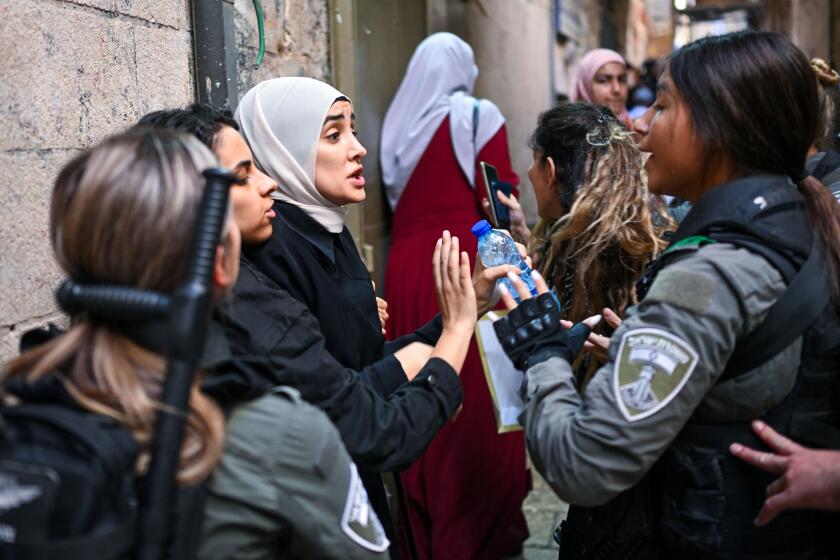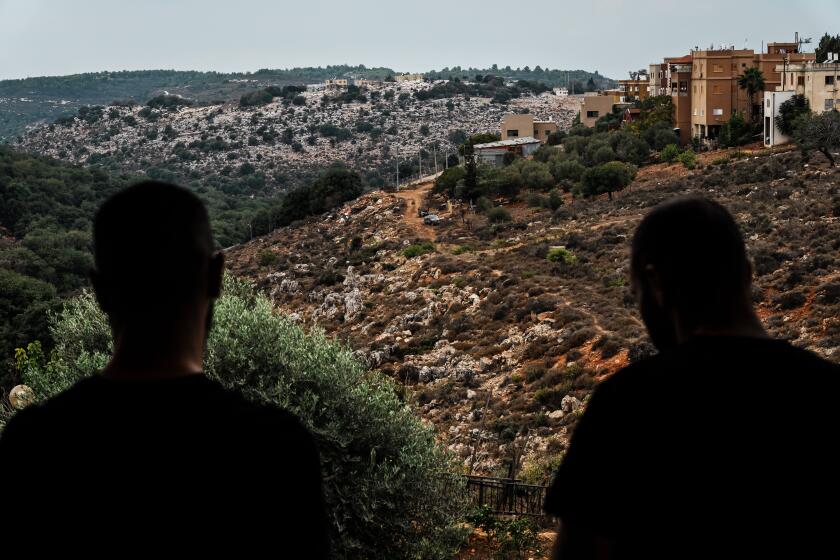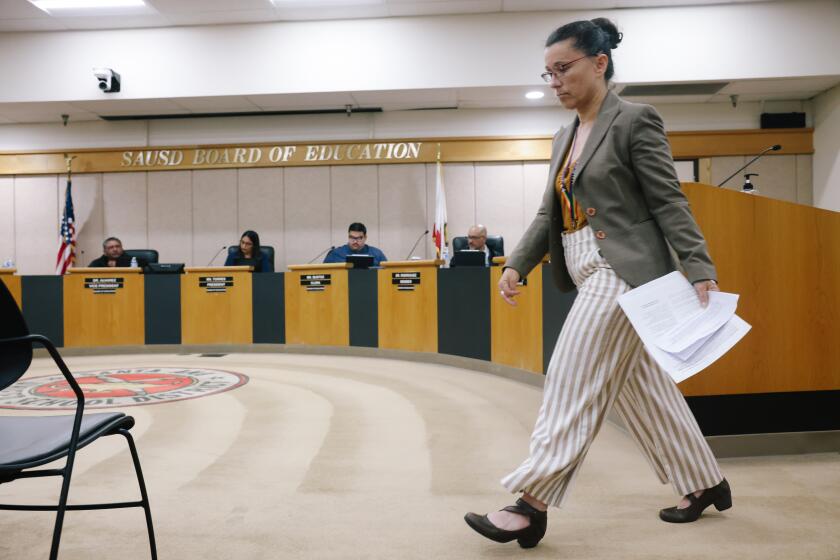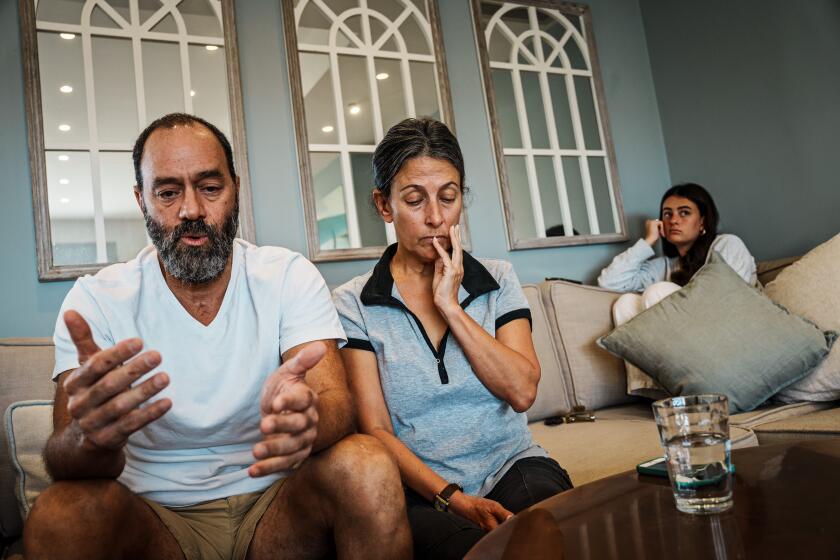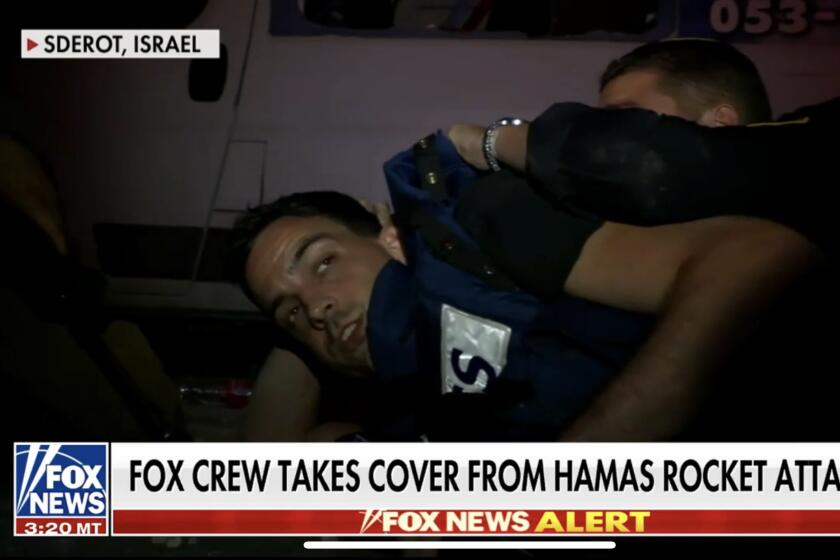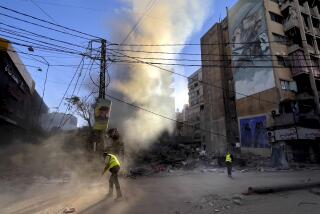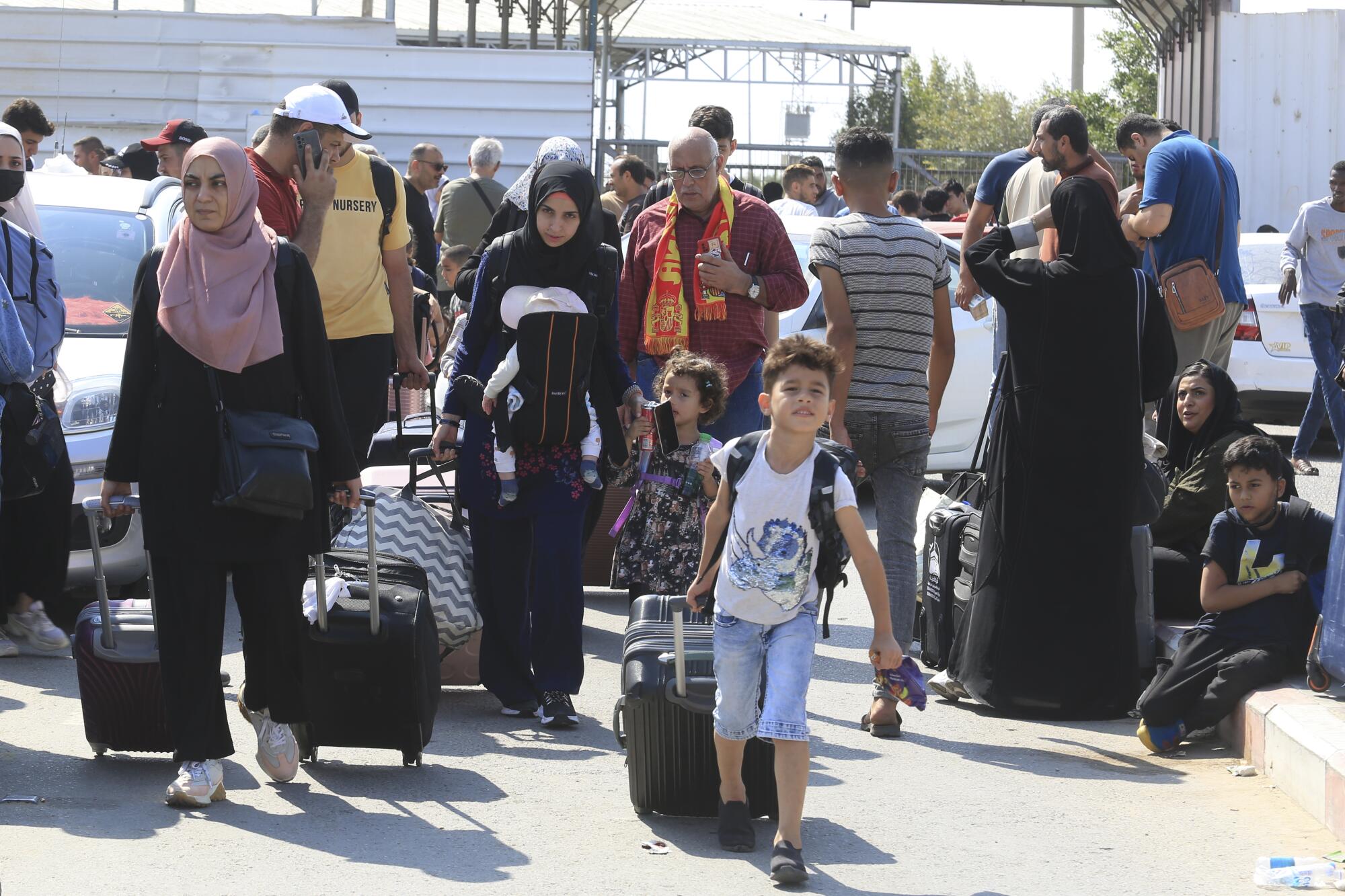
- Share via
Desperate Palestinians scrambled for escape from northern Gaza on Saturday or huddled by the thousands at a hospital in the target zone in hopes it would be spared, as Israel intensified warnings of an imminent multi-pronged offensive following Hamas militants’ grisly rampage inside Israel a week ago.
On Saturday night, the Israeli military said in a statement it was preparing a coordinated offensive in Gaza using air, ground and naval forces. In a nationally broadcast address, Israel’s chief military spokesman, Rear Adm. Daniel Hagari, accused Hamas of trying to use civilians as human shields and issued a new appeal to Gaza residents to move south.
“We are going to attack Gaza City very broadly soon,” he said, without giving a timetable for the attack against the 25-mile-long territory.
Israel earlier renewed calls on social media and in leaflets dropped from the air for some 1 million Gaza residents to move south, while Hamas urged people to stay in their homes. In a televised speech Saturday, Ismail Haniyeh, a top Hamas official, said that “all the massacres” will not break the Palestinian people.
The United Nations and aid groups have said the rapid exodus demanded by Israel would cause untold human suffering, with hospital patients, older adults and others unable to relocate.
Families in cars, trucks and donkey carts packed with possessions crowded a main road heading away from Gaza City as Israeli airstrikes continued to hammer the territory, where supplies of food, fuel and drinking water were running low because of a complete Israeli siege.
The Israeli military said “hundreds of thousands” of Palestinians had heeded the warning and moved south. It gave Palestinians a six-hour window that ended Saturday afternoon to travel safely within Gaza along two main routes.
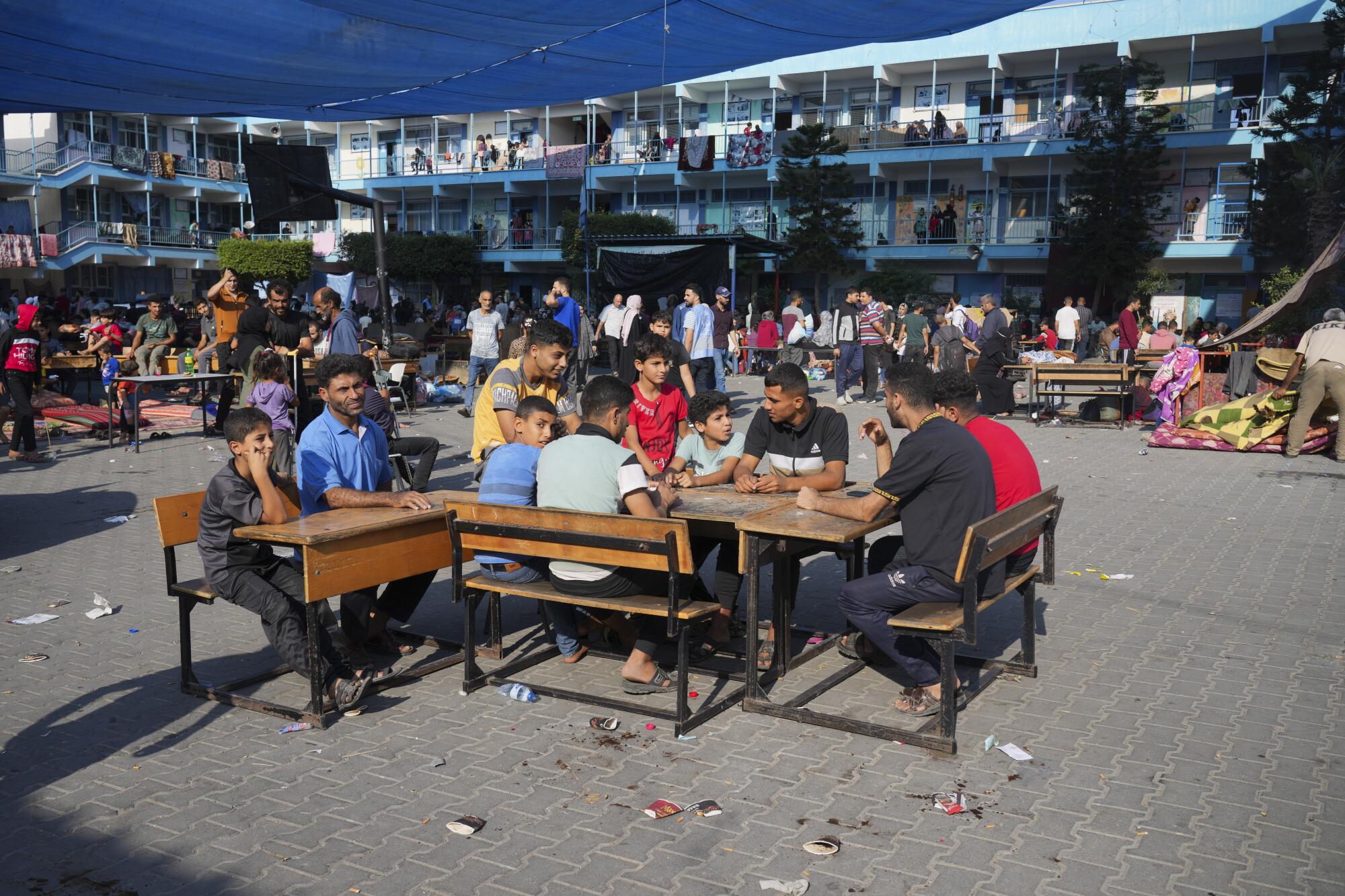
But roads demolished by airstrikes and a fuel shortage hindered the journeys of some.
Thousands of people crammed into a United Nations-run school-turned-shelter in Deir al Balah, a farming town south of the evacuation zone. Many slept outside on the ground without mattresses or in chairs pulled from classrooms.
As the Jewish Sabbath fell and Muslims marked their principal prayer day, Israelis and Palestinians struggled with the terrifying new reality after the militant group Hamas’ deadly attack on Israel.
“I came here with my children. We slept on the ground. We don’t have a mattress or clothes,” Howeida Zaaneen, 63, who is from the northern town of Beit Hanoun, said. “I want to go back to my home, even if it is destroyed.”
The Israeli military said its troops conducted temporary raids into Gaza to battle militants and hunted for traces of some 150 people — including men, women and children — who were abducted during Hamas’ shocking Oct. 7 assault on southern Israel.
A week after Hamas’ attack, Israel was still working to assess the casualties. With special rabbinic approval, workers at a military base in central Israel continued the grueling task of identifying the bodies of the Israelis and foreign nationals who were killed, most of them civilians. Work is normally halted on Saturday, the Jewish Sabbath.
Last weekend, Hamas militants crossed the border and slaughtered more than 1,300 people on the Israeli side, including children, women, foreign farmworkers and attendees of a music festival near the border with Gaza. Roughly 1,500 militants were killed during the fighting, the Israeli government said.
The Gaza Health Ministry said Saturday that more than 2,200 people had been killed in the territory, including 724 children and 458 women, as Israel has responded with a barrage of airstrikes it has said have been aimed at Hamas targets.
Israeli Prime Minister Benjamin Netanyahu on Saturday visited Beeri and Kfar Azza, two southern border communities where Hamas militants killed dozens of Israelis in their initial attack. Netanyahu met with soldiers and toured the ruins of homes where the massacres happened after having faced criticism that his government has not done enough to meet with relatives of the victims.
Hundreds of relatives of the scores of people captured by Hamas and taken to Gaza gathered outside the Israeli Defense Ministry in Tel Aviv, demanding the release of their loved ones. Protesters put up fliers with the faces and names of their relatives under the word KIDNAPPED.
“This is my cry out to the world: Please help bring [back] my family, my wife and three kids,” said Avihai Brodtz of Kfar Azza. Many expressed anger toward the government, saying they still have no information about their relatives.
At a news conference, relatives of hostages with medical conditions called on Hamas to allow a humanitarian corridor for the delivery of medicine to them. “My aunt suffers from Parkinson’s disease. She’s 63,” said Yifat Zailer. “Every day without her medication is torture.”
Meanwhile, attacks continued, with Hamas launching rockets into Israel and Israel carrying out strikes in Gaza. Palestinian militants have fired more than 5,500 rockets into Israel since the fighting erupted, the Israeli military said. Israel has called up some 360,000 military reserves and massed troops and tanks along the border with Gaza. The Hamas communications office said Israel has “completely demolished” more than 7,000 housing units so far.
An Israeli airstrike near the Jabaliya refugee camp in northern Gaza killed at least 27 people and wounded an additional 80, Gaza health authorities said. Most of the victims were women and children, the authorities said. Doctors from Kamal Edwan Hospital shared chaotic footage of charred and disfigured bodies.
It was not clear how many Palestinians remained in north Gaza by Saturday afternoon, said Juliette Touma, a spokesperson for the U.N. agency for Palestinian refugees. “What we know is that hundreds of thousands of people have fled. And that 1 million people have been displaced in total in one week,” she said.
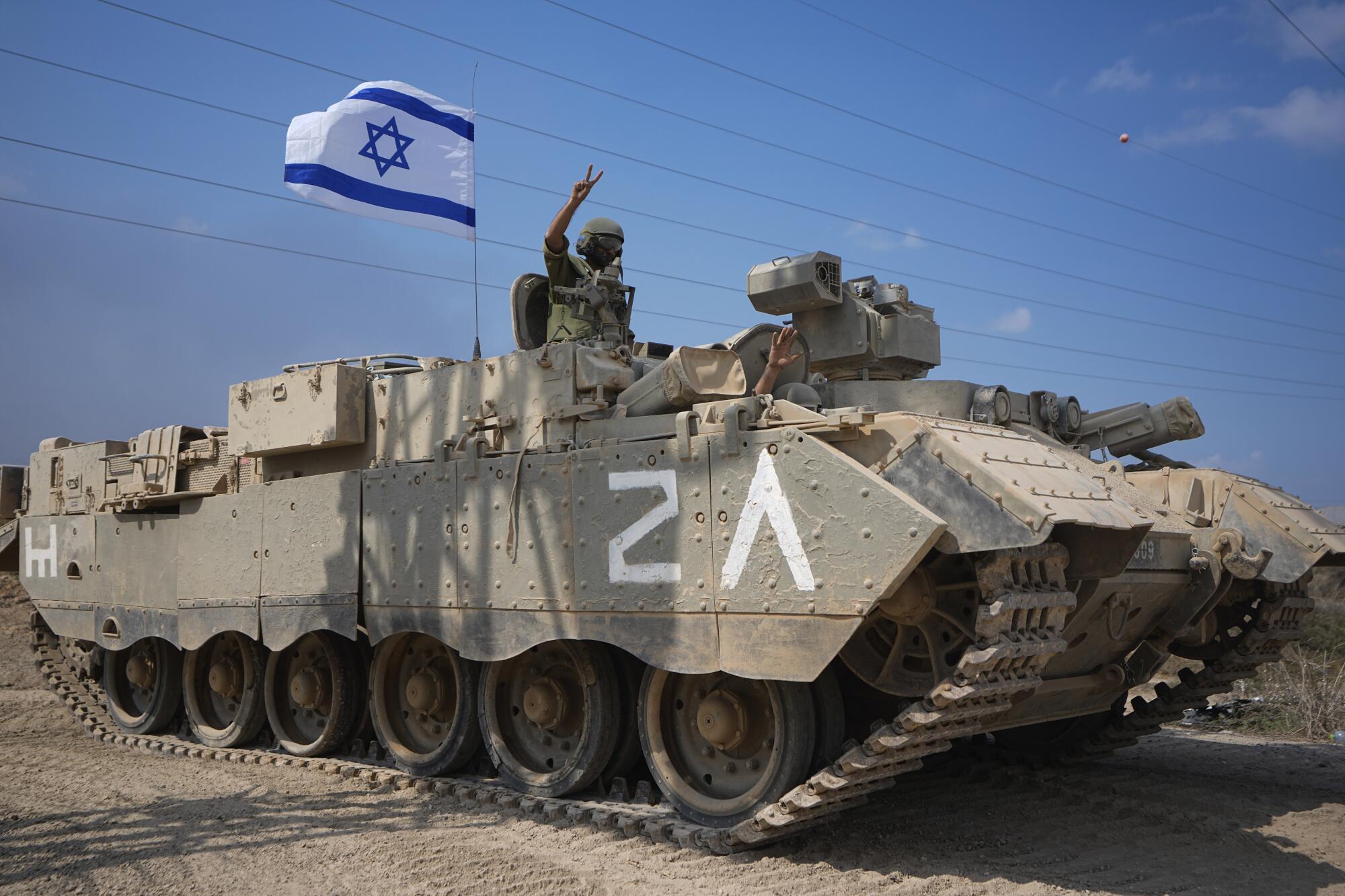
Medical officials say an estimated 35,000 had crammed into the grounds of Gaza City’s main hospital, seeking refuge ahead of an expected Israeli ground offensive.
“People think this is the only safe space after their homes were destroyed and they were forced to flee,” said Dr. Medhat Abbas, a Health Ministry official. “Gaza City is a frightening scene of devastation.”
Taps have run dry across the territory. Amal Abu Yahia, a 25-year-old pregnant mother in the Jabaliya refugee camp, said she waits anxiously for the few minutes each day or every other day when contaminated water trickles from the pipes in her basement. She then rations it, prioritizing her 5-year-old son and 3-year-old daughter. She said she is drinking so little herself, she only urinates every other day.
Near the coast, the only tap water is contaminated with Mediterranean Sea water because of the lack of sanitation facilities.
“Gaza has been out of water for almost three days, we have no power, no electricity,” said Inas Hamdan, a spokesperson for the U.N. agency for Palestinian refugees. “If there is no humanitarian corridor, consequences will be catastrophic.”
Fearing a mass exodus of Palestinians, Egyptian authorities erected “temporary” blast walls on Egypt’s side of the heavily guarded Rafah crossing, which has been closed for days because of Israeli airstrikes, two Egyptian officials said on condition of anonymity because they were not authorized to brief the media.
Egyptian officials said the Rafah border crossing would open Saturday to allow foreigners out. But by Saturday night there had been no movement. There were believed to be some 1,500 people in Gaza holding Western passports and others with passports from other parts of the world.
Raids into Gaza on Friday were the first acknowledgment that Israeli troops had entered the territory since the military began its round-the-clock bombardment in retaliation for the Hamas massacre.
The Israeli military said the ground troops left after conducting the raids.
On Israel’s border with Lebanon, residents are worried that groups like Hezbollah will join a war that eventually spirals into a regionwide conflict.
An assault into densely populated Gaza would probably bring even higher casualties on both sides in brutal house-to-house fighting.
“We will destroy Hamas,” Netanyahu vowed Friday night.
President Biden on Saturday spoke with Netanyahu and Palestinian Authority President Mahmoud Abbas urging the leaders to allow humanitarian aid to the region and affirmed his support for efforts to protect civilians.
While Biden has spoken to Netanyahu multiple times since the Hamas attack, Saturday’s call was his first to Abbas, who runs the Palestinian Authority that controls the West Bank. According to a readout of the call, Abbas briefed the president on efforts to bring aid to Palestinian people, particularly in Gaza.
Biden reiterated to Abbas that “Hamas does not stand for the Palestinian people’s right to dignity and self-determination,” according to the readout.
Biden spoke with Netanyahu to “reiterate unwavering U.S. support for Israel,” according to the readout. He briefed the Israeli leader on regional efforts to ensure civilian access to food, water and medical care.
The number of U.S. citizens killed rose to 29, U.S. officials said Saturday, and 15 were unaccounted for, along with one lawful permanent resident.
U.S. Secretary of State Antony J. Blinken met with Saudi Arabian Foreign Minister Prince Faisal bin Farhan in Riyadh on Saturday, and both called for Israel to protect civilians in Gaza.
“As Israel pursues its legitimate right to defending its people and to trying to ensure that this never happens again, it is vitally important that all of us look out for civilians, and we’re working together to do exactly that,” Blinken said.
Late Saturday, U.S. Defense Secretary Lloyd J. Austin III said that the U.S. was moving up a second carrier strike group, led by the USS Dwight D. Eisenhower, as a deterrent to any regional actors seeking to widen the war.
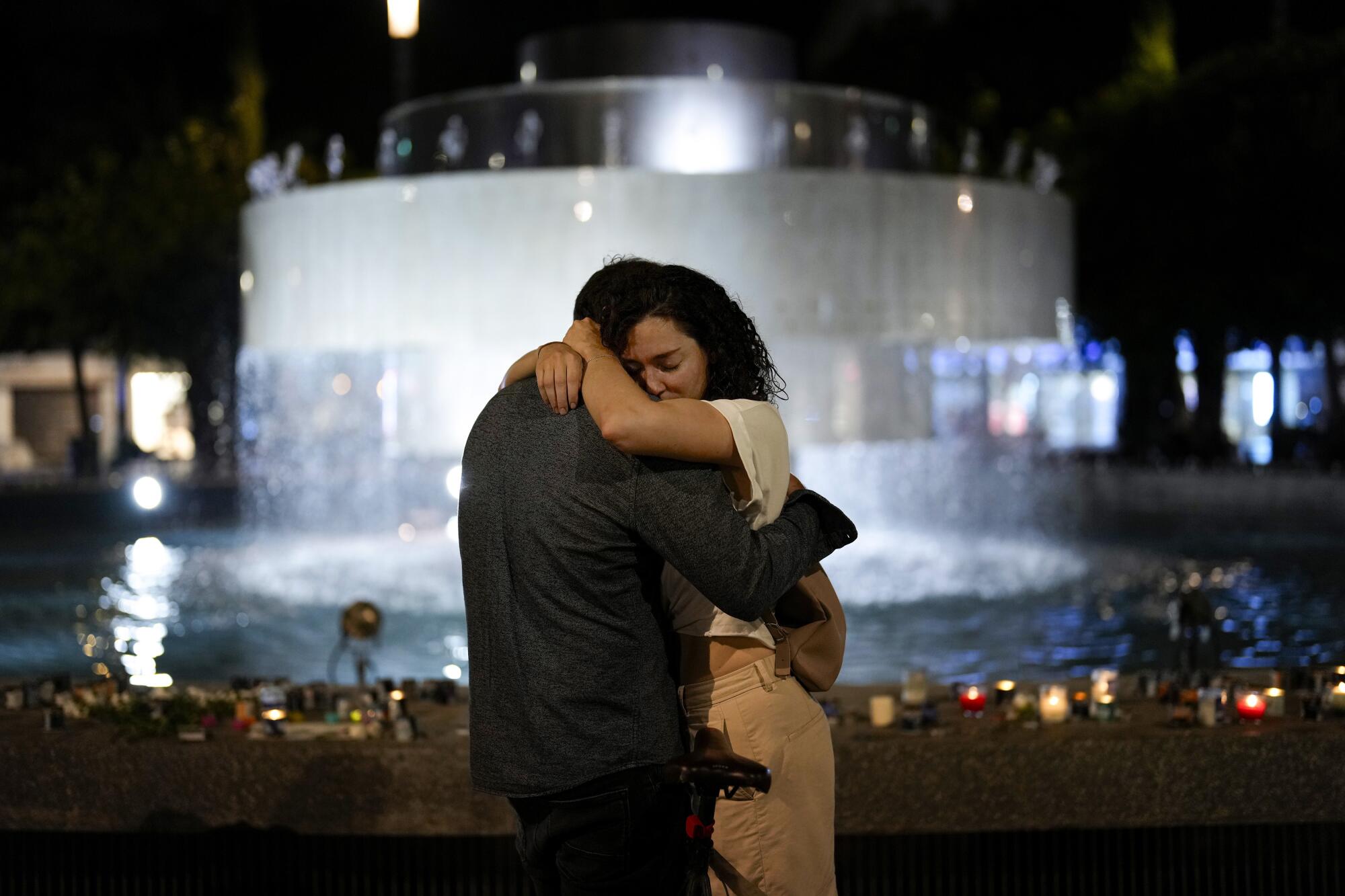
Hamas said Israel’s airstrikes killed 13 hostages, including foreigners. It did not provide their nationalities. The military denied the claim. Hamas and other Palestinian militants hope to trade the hostages for thousands of Palestinians held in Israeli prisons.
The Israeli public is overwhelmingly in favor of a military offensive, and TV news broadcasts focus heavily on the aftermath of the Hamas attack and make scarce mention of the unfolding crisis in Gaza.
In the Israeli-occupied West Bank, the Palestinian Health Ministry said 53 Palestinians had been killed since the start of the war, including 16 on Friday. The U.N. said attacks by Israeli settlers have surged there since the Hamas assault.
Breaking News
Get breaking news, investigations, analysis and more signature journalism from the Los Angeles Times in your inbox.
You may occasionally receive promotional content from the Los Angeles Times.
Palestinian families in Gaza faced agonizing dilemmas in deciding whether to leave or stay. Israeli strikes have leveled entire city blocks. And beyond the cut off of food, water and medical supplies, the territory was under a near-total power blackout.
An Israeli military spokesperson, Jonathan Conricus, said the evacuation was aimed at keeping civilians safe and preventing Hamas from using them as human shields. He urged people in the targeted areas to leave immediately and to return “only when we tell them that it is safe to do so.”
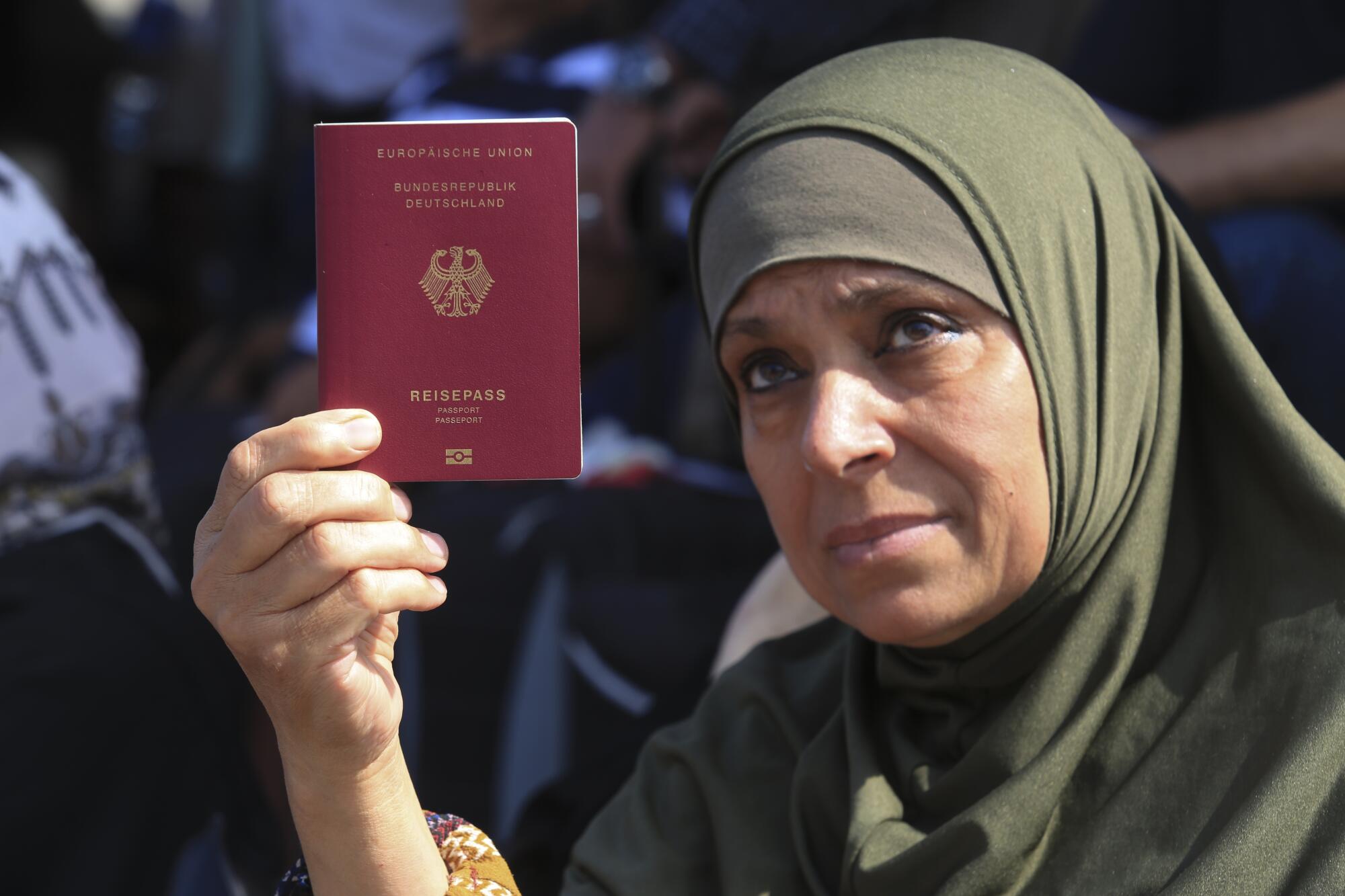
“The Palestinian civilians in Gaza are not our enemies. We don’t assess them as such, and we don’t target them as such,” Conricus said. “We are trying to do the right thing.”
The U.S. and Israel’s other allies have pledged ironclad support for the war on Hamas. However, Josep Borrell, the European Union’s foreign policy chief, said Saturday that the Israeli military needed to give people more time to leave northern Gaza.
Borrell welcomed the evacuation order but said, “You cannot move such a volume of people in [a] short period of time,” noting a lack of shelters and transportation.
An Orange County school district’s efforts to introduce lessons on the Israeli-Palestinian conflict have ignited emotional discourse among Jewish and Arab American community groups.
California native Hersh Goldberg-Polin, 23, hasn’t been seen by family since before Hamas’ attack on Israel. They’re determined to find him and bring him home.
The Israel-Hamas war is testing news media struggling with how to present the heinous casualties, combat misinformation on social media and face criticisms of bias.
More than half of the Palestinians in Gaza are descendants of refugees from the 1948 war surrounding Israel’s creation, when hundreds of thousands fled or were expelled from what is now Israel. Many feared a second expulsion, this time to Egypt’s Sinai Peninsula.
Israeli airstrikes since the Hamas attack have already forced at least 423,000 people — nearly 1 in 5 Gaza residents — from their homes as of Thursday, according to the U.N.
More to Read
Sign up for Essential California
The most important California stories and recommendations in your inbox every morning.
You may occasionally receive promotional content from the Los Angeles Times.
